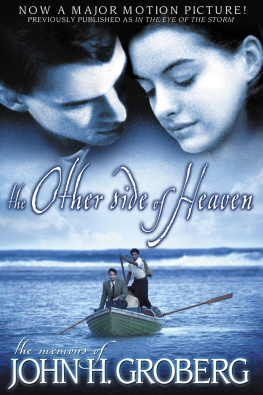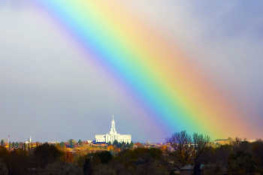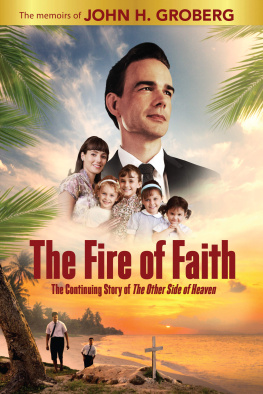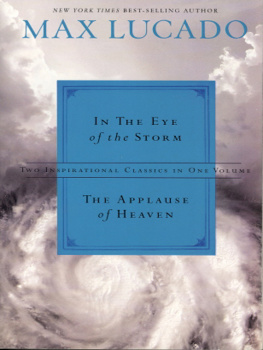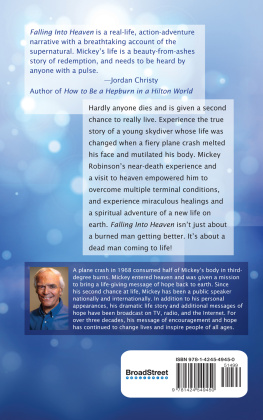The Other Side of Heaven
John H. Groberg
1993 John H. Groberg.
All rights reserved. No part of this book may be reproduced in any form or by any means without permission in writing from the publisher, Deseret Book Company, P.O. Box 30178, Salt Lake City Utah 30178. This work is not an official publication of The Church of Jesus Christ of Latter-day Saints. The views expressed herein are the responsibility of the author and do not necessarily represent the position of the Church or of Deseret Book. Deseret Book is a registered trademark of Deseret Book Company.
Acknowledgments
I wish to thank my wife, Jean, for her personal encouragement, support, and wisdom in helping develop this book, as well as the support and help of my parents, D. V. and Jennie H. Groberg, and our children, Nancy, Elizabeth, Marilyn, Jane, Gayle, John E., Susan, Thomas, Jennie, Viki, and Emily. Susan, Viki, and Emily have been particularly helpful in typing and proofreading.
I also acknowledge the wonderful people of Tonga, many of whom have moved beyond the veil but have left a legacy of faith that is difficult to describe.
My special thanks go to Richard Romney and Jennifer Scott, who have donated many hours in reading, editing, typing, retyping, and polishing the manuscript. I also thank the many others who have helped so much in many different ways.
I acknowledge the support and encouragement of several of my colleagues. Without their encouragement, this book would not be written. They know who they are, so without naming them I simply say thanks!
This is not an official publication of the Church. Although I have been helped in its preparation, I alone am responsible for the views it expresses. class="pg">xi
Introduction
Nearly forty years have passed since I began my first mission to Tonga. At the urging of many people whom I admire, I have attempted to describe some of the experiences and feelings I encountered those many years ago. The main purpose of this book is to emphasize the overwhelming need for faith in our lives.
I realize that in some ways I am describing a time and a place and circumstances that no longer exist. Yet in other ways, I am describing feelings and challenges that are as old as time and as fresh as the morning sun. I am convinced that regardless of the physical background or the decade our life's experiences are cast against, the need for love and faith to bring meaning to our lives and reason for our decisions remains unchanged.
I do not apologize for the time, the place, or the circumstances described, as that was the way it was. I suppose most people who have passed through this planet earth have lived and died closer to the type of life described herein than the hectic one we live in America today. We all need more faith, and I know we can learn from others.
In looking back and reading letters and other items written at the time, I have tried to describe how I felt then. I had no feeling that I was going into a particularly hard situation or that things were going to be tough. I had no thought of doing anything unusual, but rather simply wanted to do my best to get through each day doing as much good and as little damage as possible.
I have not attempted to analyze carefully what was going on in other people's minds or to make a sociological or psychological study, but have tried to relate things as I felt them from a twenty-year-old point of view. I suppose to a small child a horse may appear as big and fearsome as a huge monster to a grown-up. We all see and feel things based on our background and upbringing and the perceptions we have of places and people and motives at the time. I realize that some of the things I felt could be oversized or undersized and differ from how someone else might perceive them, but to me at the time, this is how things were.
I have heard people say, "Well, those people lived such a simple life and had such simple faith, it doesn't really apply to us today." I disagree.
First, their life was not so simple. At first I thought their life-style was simple, but I soon realized it was as complex as ours-not in a physical "rush here and scurry there" context, but in the context of interpersonal relationships, in finding one's place in society, and in coming to peace with God and with one's role in life. In these ways their life was no different from ours-neither more simple nor more complex-just set against a different background. Certain physical inventions may make parts of living more convenient today, but the need for faith and love has never changed-nor will it.
Second, I would not characterize their faith by the English word simple, but rather the word profound. If we say there is a "simple faith," then by extension we need to say there is a more complex or sophisticated faith and that one faith may be superior to the other. I do not believe this. I do not believe there are various types of faith, such as simple or advanced or complex or sophisticated. I believe there is just faith or lack of faith. We either have faith or we don't. Of course, some have stronger faith than others.
To me faith is like a flame; it may be as small as a tiny candle or as great as a roaring fire. A small candle can become a roaring fire or a roaring fire can be reduced to a small candle, depending on what we feed it. Both are natural flames with the power to grow or reduce; to die or consume, as opposed to a flashlight or other mechanical device that may give temporary light but cannot grow beyond its original power source.
In this world, not everyone can afford mechanical lights, but all people over all time-rich or poor, young or old, male or female-can afford fires. The growth of our personal flame depends on our faith, not on our wealth or other worldly factors.
A flame is a great refiner. I am intrigued by Malachi's words of purging and refining through fire: "But who may abide the day of his coming? and who shall stand when he appeareth? for he is like a refiner's fire, and like fullers' soap: And he shall sit as a refiner and purifier of silver.... For, behold, the day cometh, that shall burn as an oven; and all the proud, yea, and all that do wickedly, shall be stubble: and the day that cometh shall burn them up, saith the Lord of hosts, that it shall leave them neither root nor branch." (Malachi 3:2, 3; 4:1.)
Those who rely only on intellect can mechanically illuminate various subjects and do so quite well, but only the flame of faith, which is available to all men and women and which taps into God's power, can grow in unlimited amounts and shed enough light that we can eventually comprehend all things. Two verses in the Doctrine and Covenants state this principle well: "That which is of God is light; and he that receiveth light, and continueth in God, receiveth more light; and that light groweth brighter and brighter until the perfect day" (D&C 50:24). "And if your eye be single to my glory, your whole bodies shall be filled with light, and there shall be no darkness in you; and that body which is filled with light comprehendeth all things" (D&C 88:67).
Could increasing our faith in the Lord Jesus Christ, who is the light and life of the world, be the process of increasing the intensity of light within us so we can eventually comprehend all things?
We are all born with some light. The Lord said, "I am the true light that lighteth every man that cometh into the world" (D&C 93:2). We all have the opportunity to develop strong faith or have bright light in our lives. I hope we don't rely on temporary mechanical sources as a substitute for the eternal light of faith!

